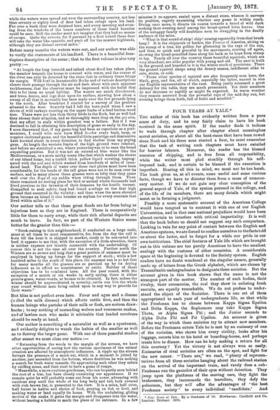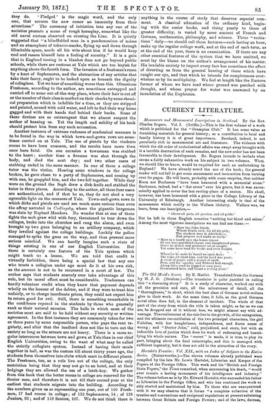FOUR YEARS AT YALE.*
THE author of this book has evidently written from a pure sense of duty, and he may fairly claim to have his book received in the same spirit. If the reader finds it tedious to wade through chapter after chapter about meaningless secret societies, or about all the boat-races that have been rowed since Noah and his three sons started a four, he must remember that the task of writing such chapters must have entailed far heavier labours. Moreover, the reader has the blessed resource of skipping, and is free from all responsibility, while the writer must plod steadily through his self- imposed task, and is certain to be blamed if the execution is imperfect. Bearing all this in mind, we must not be too harsh. The book gives us, at all events, some useful and some curious facts, though we have to disinter them from a mass of unneces- sary matter. If we do not gain any clear conception of the general aspect of Yale, of the system pursued in the college, and of the life of its members, there are many details which might assist us in forming a judgment.
Possibly a more systematic account of the American College would have tempted us to contrast it with one of our English Universities, and in that case national prejudices would have been almost certain to interfere with critical impartiality. It is well that the book before us should not suggest any such comparison. Looking in vain for any point of contact between the English and American systems, we are forced to confine ourselves to the facts told us about the latter, and to forget for a while our pride in our own institutions. The chief features of Yale life which are brought out in this volume are too purely American to have the smallest analogy with the customs of other countries. A considerable space at the beginning is devoted to the Society system. English readers have no doubt wondered at the singular names, generally made up of letters from the Greek alphabet, which are chosen by Transatlantic undergraduates to designate these societies. But the account given in this book shows that the name is not the strangest part of the matter. The number of such bodies, their rivalry, their ceremonies, the zeal they show in enlisting fresh recruits, are equally remarkable. We do not profess to under- stand the object of the Societies. There is one set of them appropriated to each year of undergraduate life, so that while the Freshman has to choose between Kappa Sigma Epsilon and Delta Kappa, the Sophomore may take Kappa Sigma Theta, or Alpha Sigma Phi ; and the Junior ascends to Alpha Delta Phi and Psi Upsilon. An account is given of the way in which these societies try to attract new members. Before the Freshman enters Yale he is met by an emissary of one of the societies, who shows him every civility, looks after his luggage, escorts him to his hotel or boarding-house, and perhaps treats him to dinner. How can he help making a return for all this courtesy ? Yet the victory is not always won so easily. Emissaries of rival societies are often on the spot, and fight for the new comer. "There are," we read, "plenty of represen- tatives from all three societies hanging about the railroad station on the arrival of the important train, and rarely does a sub- Freshman run the gauntlet of their eyes without detection. They jump upon the platforms of the moving cars, they fight the brakesmen, they incommode the travellers, they defy the policemen, but they will offer the advantages of 'the best Freshman society' to every individual 'candidate.' And
* Four Years at Yale. By a Graduate of '69. Newhaven: Chatfield and Co. London: Trubner. 1871.
they do. 'Pledged' is the magic word, and the only one, that secures the new comer an immunity from their attentions." The ceremony of initiation into any one of the societies presents a scene of rough horseplay, somewhat like the old naval custom observed on crossing the Line. It is quietly suggested that "a blindfolded man in a pandemonium of noises and an atmosphere of tobacco-smoke, flying up and down through illimitable space, needs all his wits about him if he would keep cool and reason himself into a feeling of security." It is a gain that in England tossing in a blanket does not go beyond public schools, while there are customs at Yale which are too boyish for anything above the fourth form. The invasion of a freshman's room by a knot of Sophomores, and the abstraction of any articles that take their fancy, ought to be looked upon as beneath the dignity of collegians. Yet we hear of something worse than this. Obnoxious Freshmen, according to the author, are sometimes entrapped and carried off to some out-of-the-way place, where their hair is cut off or the number of their class is marked on their cheeks by some chemi- cal preparation which is indelible for a time, or they are stripped and painted, soused with cold water, and left to find their way home gagged and with their hands tied behind their backs. Some of these devices are so extravagant that we almost suspect the author of hoaxing us. Yet the length and solidity of his book should protect him from any such accusation.
Another instance of extreme rudeness of academical manners is to be found in the way in which town-and-gown rows are some- times carried on at Yale. The use of pistols by the students seems to have been common, and the results have more than once been fatal. On one occasion a townsman was stabbed to the heart ; another time a fireman was shot through the body, and died the next day ; and two other cases of stabbing ended in the same manner. In one of these a college tutor was the victim. Hearing some windows in the college broken, he gave chase to a party of Sophomores, and coming up with one, he grappled him, and the two fell together. While they were on the ground the Soph drew a dirk-knife and stabbed the tutor in three places. According to the author, all these four cases are authenticated, and if that be so, they do not shed a very agreeable light on the manners of Yale. Town-and-gown rows in which dirks and pistols are used are much more serious than even the affray narrated in Codlingsby, where the gigantic bargeman was slain by Raphael Mendoza. No wonder that at one of these fights the mob grew wild with fury, threatened to tear down the colleges, broke into the churches and rang the alarm, and even brought up two guns belonging to an artillery company, which they levelled against the college buildings. Luckily the police managed to spike the guns on the way, and thus prevent more serious mischief. We can hardly imagine such a state of things existing in one of our English Universities. But there is certainly one feature of the Yale system which
might teach us a lesson. We are told that credit is virtually forbidden, there being a special law that any one who trusts a collegian under age must do it at his own risk, as the amount is not to be recovered in a court of law. The author says that students scarcely ever take advantage of this rule, but its moral effect must be considerable. Tradesmen can bardly volunteer credit when they know that payment depends wholly on the honour of the debtor, and if they were to treat him unfairly, or to charge inordinate prices, they could not expect him to return good for evil. Still, there is something remarkable in the confidence reposed in the students by those who generally rank as their natural enemies. The halls in which most of the societies meet are said to be held without any security or written agreement. In the first instance they are commonly taken for two or three years by some responsible person, who pays the rent re- gularly, and after that the landlord does not like to turn out the society so long as the arrears are not heavy. There is a more re- gular intercourse between town and gown at Yale than in our chief English Universities, owing to the want of what may be called the strictly collegiate system. Instead of having their meals together in hall, as was the custom till about thirty years ago, the students form themselves into clubs which meet in different places. The Freshmen, too, as a rule live out of the college, the only restriction being that they may not go to an hotel, and at their lodgings they are allowed the use of a latch-key. We gather from this book that the better rooms in college are reserved for the senior men, and therefore it is not till their second year at the earliest that students migrate into the building. According to the numbers given us as representing one year, out of 160 Fresh- men, 17 had rooms in college ; of 132 Sophomores, 54; of 128 Juniors, 93; and of 119 Seniors, 107. We do not think there is anything in the course of study that deserves especial com- ment. A classical education of the ordinary kind, begin- ing with the easier books, and rising yearly to those of greater difficulty, is varied by some amount of French and German, mathematics, philosophy, and science. Three " recita- tions " daily—we should call them lectures—each lasting an hour, make up the regular college work, and at the end of each term, as at the end of the year, there is an examination. If there are any other essential features of the system that we have omitted, we must lay the blame on the author's arrangement of his matter. His laudable anxiety to impart every fact has sometimes the effect of diverting us from the general bearing of those which have caught our eye, and that which he intends for completeness over- whelms us by its multiplicity. We feel at length like the Eastern farmer of whom we have read whose ground was parched with drought, and whose prayer for water was answered by an inundation of the Euphrates.



































 Previous page
Previous page